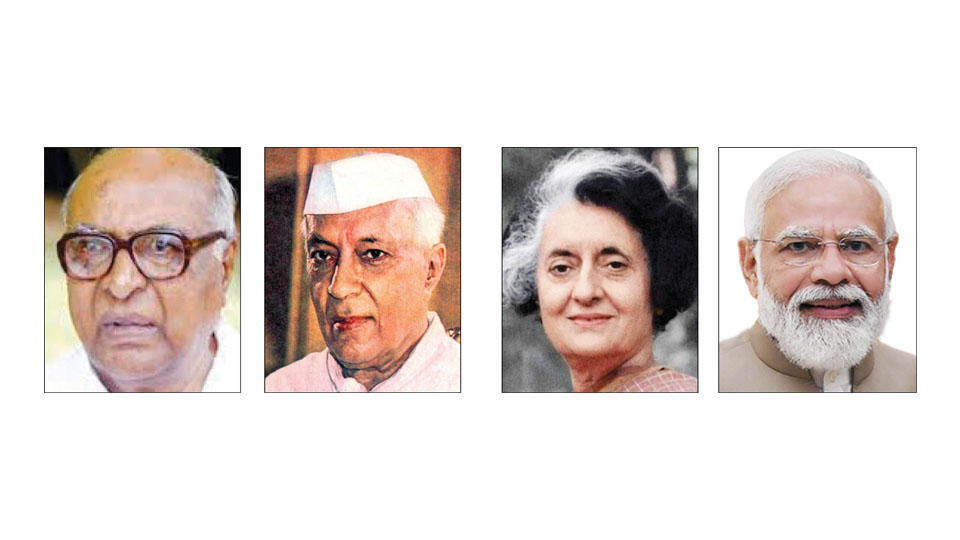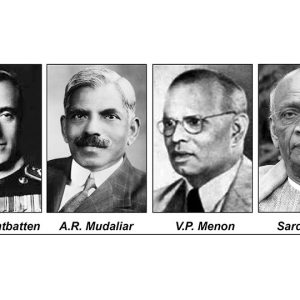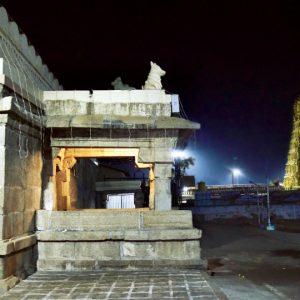
Revisiting the past in 2024
Among academicians in Mysuru, nay in India, if at all there was a Nehru fan and loyalist, it was Prof. C.D. Narasimhaiah (CDN), Professor in English, Manasagangothri, University of Mysore (1921-2005). He was best known for his literary criticism and bringing out an abridged version of Nehru’s magnum opus ‘Discovery of India’ under the title ‘Rediscovery of India.’
For decades, his name was synonymous with the English Department and as a teacher par excellence. In his days he was an iconic figure among the english literary scholars so much so he was much sought after by the foreign Universities where English was taught to give lectures or to participate in seminars.
Why do I remember him now?
There is an accidental reason. Yesterday afternoon a sub-editor was rummaging the editorial files and scrapbooks, like delving into archives, as he was looking for a reference about the ongoing Parliamentary election. All of a sudden, I heard him hallooing at me to draw my attention for a discovery he made.
It was a letter written to me by Prof. C.D. Narasimhaiah in the year 2000 to be one of the speakers at the Nehru symposium on ‘Indian Leadership and Indian Destiny’ scheduled for Nov. 14 and 15. The participants represented those engaged in a wide range of nation building activities like agriculture, defence, education, science, arts, health industry, creative writing, journalism, etc. Apparently, I came under the journalism slot. So it was that I got an opportunity to submit my paper on the appointed day. By sheer serendipity I could get the copy of the talk I delivered at the symposium.
But for the file copies of the talk and the letter I cannot remember the occasion now. I called the talk as ‘The Mystery of Indian Democracy.’ Be that as it may, since the 2024 Parliamentary election is going on in phases, let me publish the talk without further ado:
Dhvanyaloka Inter-generation Meet on Current Affairs (DIMCA). I go breathless. First things first. Congratulations on your first anniversary.
Anniversaries are generally celebrated with a bash. I do not know if it follows this meeting. However, I would like to share some of my feelings and thoughts about venturing into something innocuous and enlightening as DIMCA. I learn it is a brain-child of Dr. H.S. Shivanna and few of his friends of the intellectual realm like Prof. CDN and Prof. K.C. Belliappa. May be, it was an idea whose time had come.
And with a place comparable to Arcadia of Athens to hold the meeting willingly offered by CDN, nothing could stop these friends in launching their ship of knowledge and information.
I congratulate them on this occasion. A small wonder. DIMCA has chosen me to be the speaker on their first anniversary.
I don’t know if I am the 12th or the 13th speaker here. All the same, having heard so many bright and eloquent ones speak on varied subjects in this very hall, I stand before you with apprehension about my ability to match my predecessors. Of course, I am not a stranger to this place as most of you will know. But each time, I used to be where you are seated now. This is the first time I am put on this podium.
You will agree, being a journalist I am better-off as a pen-pusher, I am more a wordsmith than a soundmaster.
With this preface let me come to the subject of my talk on “Indian Democracy and Universal Adult Franchise.”
There was a brief encounter between me and Prof. Belliappa with regard to the subject of this evening’s talk. This being an election month, Professor’s natural choice was “Election ‘99.”
I thought, it was rather too unwieldy a subject for me to handle, unidimensional and multi-dimensional. And in any case, all of you being exposed to newspapers and TV, much of what I would say on this would be a repetition.
Hence, I suggested the present subject because it is more focussed and touches on the fundamentals of our polity. I thank Prof. Belliappa for his indulgence.
The Mystery of Indian Democracy
Democracy means rule by the people and democracy is measured by the measure of freedom its humblest citizens enjoy. By this definition Indian democracy should be considered by far the best. The humblest citizen here has freedom to remain illiterate, poor and in a state of nature.
Look at those in the tribal and rural areas of Bihar, UP and other parts of our country including Karnataka. According to political philosophy, that Government is the best which governs the least. Surely ours is the best Government because we have the least governance. There is no sarcasm in what I say. The Indian truth sounds that way. It is said that the people do not know what they want and, therefore, it is the duty of the government to give the people what they need. This is the reason why I would like to discuss here today not the history of Indian democracy but the mystery of Indian democracy.
In ancient Rome, the candidate contesting for the Senate paid close attention to his statements and actions that would make voters see him favourably. Therefore, in the ancient Rome, candidates wore pure white togas like our own Congressmen in the days of Nehru and Lal Bahadur Shastri. The Latin word candidatus means ‘clothed in white’ to indicate that they were pure, clean and above any ‘dirty work.’ However, it is interesting to note that such a toga was not worn after election; just like our Congressmen.
Now the Indian democracy has to stand and survive on the strength of this kind of candidates who will represent them in the Council, Legislature or Parliament, the law-making bodies. It has been going on for the last 50 years and yet India has survived as a democracy, no matter intellectuals call it a functioning anarchy. This is the mystery of our Democracy.
The intellectuals could as well be right in wondering why India is still a democracy. Honestly, India virtually has everything inimical to its survival as a democratic country — like poverty, strong sub-national identities in the form of religion, caste, language, region and ethnic groups. Add to this the large income disparities, weak industrial base and rural poverty. Therefore, if democracy is surviving in our country despite this severely adverse conditions what else is it but an Indian mystery? People are incapable of throwing up either a revolution or a dictatorship. Why? That again is the mystery.
Mr. Jayaprakash Narayan (JP) not only spoke of a ‘Total Revolution’ but also strived hard to bring about one by Gandhian methods. But no revolution can ever take place without ‘blood and iron.’ Sacrifice. And naturally JP failed or rather people failed him. People who were not ready to sacrifice like their earlier generation who fought for freedom under different leaders including Mahatma Gandhi. Therefore, only an evolution is possible. But then an evolution takes a very long time to give results. Probably India is going through this phase of evolution. And, of course, Indians, of whom a majority are Hindus, 85 percent of them, have patience and tolerance in much abundance that it is found nowhere in the world. That is another mystery of Indian democracy.
It is indeed fortuitous and lucky for India, that despite the failure to provide a stable government in the last decade or so, the democratic institutions like the Parliament, Executive, Judiciary, the Press and importantly the Election Commission have functioned well, no matter a bit noisy. And no serious contender for power, either from among the political parties or individuals (of Indian or foreign origin), has questioned the democratic rules of the game which all of them might have moulded, twisted or circumvented.
Consider this very important fact of our democracy. The voter turn-out rates are well above those in the world’s undisputed democracy, the United States. This I call the mystery of Indian democracy.
Having said this, I would like to briefly mention the possible reason for the success of democracy in India. One reason that comes to my mind is the operation of the system of checks and balances which is in-built in our social system rather than in our political system. We must remember that this is happening in a country steeped in superstition and feudal loyalty. Deeply religious people follow social and religious customs with great reverence. If it is the laws that contribute more to the maintenance of the democratic republic in western countries, in India it is the customs that contribute more than the laws to maintain democracy. For further explanation, we must go to the realm of sociology.
Another reason that may have helped democracy to survive in our country, according to some intellectuals, believe it or not, is the caste system. Since this in itself is a vast subject of study for researchers, I shall not venture to develop on it. I just thought, since everybody is talking ill of the role played by castes in politics, while practicing it in private, I may draw your attention to this reality. You may mull over it and sleep in peace. This is also another mystery of Indian Democracy.
Yet another mystery of Indian democracy is that it accepted a single political party to rule the country for as long a period as 45 years of its 52 years of independence, despite the party being unable to alleviate poverty, eradicate illiteracy and improve the general well-being of the voters.
I am talking about the Congress party. One scholar has said that the Congress since mid 70s has survived not as an effective political organisation but as a forum of personal control by its leader. It was Indira Gandhi during 70s and since 1998 it is Sonia Gandhi who is at present our Prime Minister-in-waiting. This is yet another mystery of Indian democracy.
Indian democracy owes much to giants like Goplakrishna Gokhale, Bal Gangadhar Tilak and Mahatma Gandhi rather than to our Maharajas. But paradoxically the Congress party today has more Maharajas in its galaxy of leaders than any political party. Democracy’s life blood is political parties. But Congress is the oldest and the only visible political party. Where are others? That is the mystery of Indian democracy.
Consider this fact of history. At the time of the British rule India had 554 Rajas and Maharajas, Nizams and Nawabs, and they were subservient to the British. If all these 554 had come together with an understanding that each one of them would respect the sovereignty and boundary of their respective kingdoms, they could have easily driven away the British.
Apparently they could not come together because of the ingenious British diplomacy of which the policy of ‘divide and rule’ is well-known. But the same Maharajas and Nawabs came together after Independence and formed what was known as a ‘concord of princes’ to fight the abolition of privy purse. It is therefore obvious that these Indian princes were only interested in themselves and not in the country’s freedom or its democracy. Yet our political parties are pampering them.
Even today in the Congress party we find largest number of Rajas and Maharajas than in any other political party of our country. People of India, used to feudal loyalty, are supporting this party making it the single largest party in terms of vote share. This is another mystery of Indian democracy.
I am afraid I have spoken for too long and exceeded the time granted to me, but before I conclude I must also speak about the Universal Adult Franchise which is the second part of the subject of my talk.
Our Constitution speaks of our democracy based on adult suffrage subject, of course, to the Representation of People’s Act 1950. In the Constituent Assembly where it was discussed, a large number of members spoke against universal adult franchise suggesting restricted franchise like in the West in the early days of democracy. In America women were allowed to vote 80 years after independence!
It was Nehru, who vehemently opposed the suggestion and insisted on the universal adult franchise. While this decision, in a way, helped create political awareness amongst our illiterate and poverty-stricken brothers and sisters of tribal and backward classes, it also helped throw up unprincipled, unscrupulous leaders like Lalu Prasad Yadav, Mulayam Singh Yadav, late Kalpanath Rai, Mayawati, Sukh Ram, Phoolandevi etc.
Now the question arises what are our educated, intellectual class of people doing to keep these unscrupulous leaders at bay? You want the answer? It is said if you can’t beat the opponent, join him. And that’s what most of our educated intellectuals are doing. Otherwise, why should, of all persons, T.N. Seshan and Dr. Karan Singh enter electoral politics at this stage of their life and join, of all political parties, the Congress?
Similarly we have the example of the sacked Naval Chief canvassing for Congress candidates and the former SC Judge Ramaswamy, who was to be impeached by the Parliament for corruption, contesting as AIADMK party’s candidate and many others. These intellectuals are contesting the election either to settle personal scores or to take revenge.
No wonder Mr. Nani Palkhiwala defined an intellectual as one who knows which side of the bread is buttered. Looking at this kind of educated and intellectual people, I feel Nehru was perfectly right and justified in advocating universal adult franchise. For, after all as far as the negative qualities are concerned, in India, there is hardly any difference between an illiterate poor Indian and an educated rich Indian. This is yet another mystery of Indian democracy.
Thank You!
After some time, on 4th May, 2001, I received a letter from The Literary Criterion Centre, Dhvanyaloka, signed by Prof. C.D. Narasimhaiah saying that he had (now) decided to publish the papers as they would “stimulate further thinking on the subject though I fear we are not a nation of readers. But that shouldn’t inhibit us.”
Then he humbled himself and made a request: “Could you very kindly give a good second look to your paper and send me the clear text for the press?”
I do not know if I sent the text at all as there is no reference paper in the archival file.
e-mail: [email protected]








Recent Comments